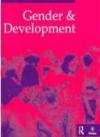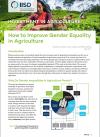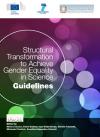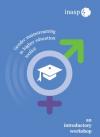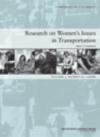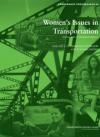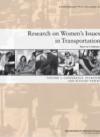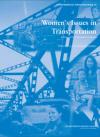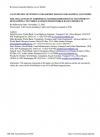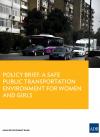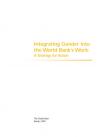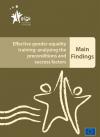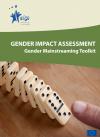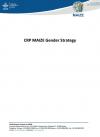Resources
13 Jul 2017
Oxfam, 2017: Journal issue of Gender and Development focuses on water and sanitation from the perspective of gender justice and women's rights. It highlights the importance of WASH provision for women and girls, examines the gender aspects of WASH in more detail,and considers current policy and programme approaches to WASH that aim to address women’s and girls’ needs and interests.
21 Jun 2017
International Institute for Sustainable Development, 2017: Policy brief explores how global standards and guidelines contribute to gender equality and women’s
empowerment, and whether more can be done through these instruments to improve the situation of women in
agriculture.
TYPE: Policy briefs
22 Feb 2017
World Bank, 2015: Study illustrates the extent to which energy subsidy reforms in the Europe and Central Asia regions differently impact men and women, and seeks to understand
whether gender-specific behavioral change and corresponding mitigation measures would help men and women better adapt to these reforms.
REGIONS: Central and South Asia, Other
TYPE: Case studies, Reports
08 Feb 2017
European Commission, 2015: Guidelines to help science organizations develop and implement policies to promote women’s participation in science, including collecting data and monitoring gender equality, engaging leaderships, policy-making and institutionalisation, etworking and empowering women to take action, integrating gender in education and research, and communications.
07 Feb 2017
International Network for the Availability of Scientific Publications (INASP), 2016: Toolkit provides the materials
and resources to run a gender sensitization
workshop within an institution, with six modules
covering topics from exploring gender concepts, to
considering gender in a higher education context,
to developing an initial action plan based on the
workshop outcomes.
TYPE: Toolkits
27 Oct 2016
U.S. National Academies, 2004: Conference report contains peer-reviewed breakout and poster papers and several abstracts of papers on subjects including influence of residential location on travel behavior of women, gender differences in choice of transportation vehicle, women's concerns relating to transport options, and risk of injury to women resulting from transport.
TYPE: Reports
27 Oct 2016
U.S. National Academies, 2011: Conference report presents peer-reviewed papers on changing demographics and women’s travel behavior, transportation policy considerations for female travelers, protecting the safety and personal security of female transportation users, and studying the impacts of extreme events on female travelers.
TYPE: Reports
27 Oct 2016
U.S. National Academies, 2004: Conference report presents peer-reviewed papers that identiy and explore additional research and data needed to inform transportation policy decisions that address women’s mobility, safety, and security needs.
TYPE: Reports
27 Oct 2016
Transportation Research Board of the U.S. National Academies, 2011: Conference report highlights the latest research on changing demographics that affect transportation planning, programming, and policy making as well as the latest research on crash and injury prevention for different segments of the female population, particularly pregnant and elderly transportation users.
TYPE: Reports
27 Oct 2016
John Riverson, Mika Kunieda, Peter Roberts, Negede Lewi and Wendy M. Walker, 2005: Paper describes steps which are being taken by the World Bank to improve the effective meeting of gender needs in transport, summarizing examples of good practice and illustrating their application
in Ethiopia.
REGIONS: Sub-Saharan Africa
27 Oct 2016
Asian Development Bank, 2015: Policy brief draws on rapid assessments of sexual harassment in public transportation conducted in three countries in Asia, and attempts to specify recommended actions to prevent and address sexual harassment in public transportation and its related spaces such as train platforms and bus stops.
12 Oct 2016
World Bank, 2002: Strategy identifies gender-related barriers to poverty reduction and sustainable development; and recommends appropriate actions to reduce these barriers; it is intended to establish an enabling environment
to foster country-led, country-specific strategies for changing the gender patterns that are costly to growth, poverty reduction, and human well-being.
12 Oct 2016
European Institute for Gender Equality, 2014: Publication summarises the findings of the in-depth study of gender-equality training performed in the framework of EIGE’s 2-year project, Gender Training in the European Union; it looks at the preconditions and factors contributing to effective delivery of training on gender equality.
TYPE: Training
12 Oct 2016
European Institute for Gender Equality (EIGE), 2016: Toolkit provides guidance for government and other institutions to assess whether their policies, programmes, action plans and projects reduce, maintain or increase the gender inequalities between women and men.
12 Oct 2016
CGIAR: Strategyoutlines the process and approach that the MAIZE program has adopted in order to contribute to and promote gender equality and equity in agricultural research for development (R4D) related to maize-based systems.
- ‹ previous
- 2 of 9
- next ›




